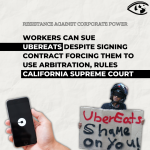Bumper Year for Corporate Donations Reveals Profit Motives

U.S. corporations gave away $18.15 billion in charitable donations in 2012 - a combination of cash, grants, and in-kind goods (typically material products) - according to the latest Giving USA report. Corporate giving is up 12.2 percent in nominal terms (or 9.9 percent in inflation-adjusted dollars) which may seem surprising given the parlous state of the national economy.
This must strike the millions of U.S. workers - who have been laid off from their jobs in the corporate world during the long and deep recession - as anomalous. They can't get their jobs back, because at the current rate of hiring, corporations and other sectors are hiring so slowly that it will take until 2020 before the U.S. economy reaches pre-recession unemployment conditions. Despite this, the companies have billions to give away?
Well, companies do not "substantially invest in corporate giving unless it adds economic value," say a trio of business academics - Baruch Lev of New York University's Stern School of Business, Christine Petrovits of George Washington University's Department of Accountancy, and Suresh Radhakrishnan of the University of Texas at Dallas' School of Management.
It might be just a coincidence but corporate giving actually follows the stock market very closely. When the Dow Jones Industrial Index increased 25.7 percent between 2009 and 2012, company giving went up 28.7 percent. This is despite the fact that U.S. gross domestic product increased just 12.2 percent and unemployment hardly changed from just over 8 percent.
A closer look at Giving USA's 2012 report reveals patterns that show that the academics definitely have a point.
Less than 0.07 percent of all U.S. companies that reported profits were responsible for just about four-fifths of all corporate charitable deductions in 2010. (Keep in mind that the vast majority of incorporated businesses are very small and a number of them are individuals who set up corporations to better manage their tax affairs.)
In fact a relatively small number of powerful and profitable corporations were responsible for the bulk of corporate charity whether in direct giving or corporate foundation giving. The top 50 corporate foundations accounted for $2.87 billion in 2011 or roughly 55.5 percent of all direct corporate grantmaking, as measured by the Foundation Center. (Corporations that do not give through corporate foundations are not required to reveal details of their charitable giving, so the bulk of corporate grantmaking-cash and in-kind-occurs outside of entities that report who they give money to on official 990 forms.)
Big Pharma "Donations"
So who are these generous companies? In 2011, the two largest were Sanofil-Aventis and Novartis, a French and Swiss pharmaceutical multinational respectively, that sell a variety of drugs notably for cancer. In fact, four of the top 20 and eight of the top 30, were the foundation arms of pharmaceutical manufacturers.
What do they give away? Some of those large pharmaceutical companies are "patient assistance" foundations, providing financial support to individuals in purchasing prescription medicines, but pharmaceutical companies are also huge givers of in-kind products, i.e. presumably their own drugs.
In general, pharmaceuticals companies also account for the majority of non-cash giving. "Noncash contributions as a percentage of total [corporate charitable] contributions [through corporate foundations and direct contributions] grew in aggregate from 57 percent in 2007 to 69 percent in 2012," writes the Committee Encouraging Corporate Philanthropy (CECP), a CEO membership organization promoting corporate charitable giving.
Pharmaceutical corporations also topped the CECP corporate giving survey in terms of median total giving as a percentage of revenue. They gave away 0.26 percent which is over double the 0.12 percent of revenue for all corporations in the CECP survey. The same is true of profits - healthcare companies gave away 1.32 percent of pre-tax profit compared to 0.95 percent.
Non-cash donations of product "actually be a profit maximizing...as part of an inventory control issue when they have excess inventories" for some corporations, says Patrick Rooney of Giving USA in an interview with Nonprofit Quarterly. For a corporation that donates goods or product at wholesale, "you've covered your cost of production...then you reduce your inventory costs because you're no longer carrying the good, you get the tax deduction for the donation of the product and you create some goodwill." Based on this theory, the pharmaceutical companies are actually profiting from ostensibly giving making donations.
These big healthcare companies have a lot of cash - the top 11 global pharmaceutical companies pocketed $711 billion in profits in the ten years ending in 2012, says Ethan Rome of Health Care for America Now.
Walmart's "Donations"
The drug companies are definitely not the only sector that is using corporate grantmaking to influence public policy. Walmart, for example, is always ranked among the top five corporate foundations giving away some $200 million a year. That does not include non foundation giving, which bumped its total up to over $1 billion in 2012.
For example when Walmart tried to win support for the construction of its proposed new mega store in Washington DC, the company launched "hunger initiatives that the company paid for through its charitable organization" including $3.8 million in grant support to the D.C. Central Kitchen and the Capital Area Food Bank.
When Washington DC's City Council's passed a bill to require "big box" retailers like Walmart to pay employees a living wage no lower than $12.50 an hour as opposed to the DC minimum wage of $8.25, company supporters claimed that "millions of dollars in charitable contributions to community groups" would be jeopardized if Mayor Vincent Gray did not veto the bill.
This is not unusual - Walmart's rock bottom wages force a large proportion of its employees, according to various local studies from Wisconsin, Ohio, and elsewhere, to turn to food stamps and other taxpayer-subsidized assistance.
The charity-for-approvals trade-off leaves Walmart with huge profits and Walmart employees with desperately low wages.
Charity Helps Overlook Workers Rights
By contrast, the Forever 21 retail chain, which reported roughly $2.6 billion in sales in 2011, gave away just $9.5 million in total cash and merchandise donations, to groups like the American Red Cross, Susan G. Komen for the Cure, Big Brothers Big Sisters, and the Starlight Foundation.
This is a company that decided to demote full-time workers to part-time status and deny them benefits, according to a company memorandum issued in August so that they would not have to provide health insurance for its employees, that were mandated under the Affordable Care Act.
This raises a difficult question - how many charities would turn down a Walmart or Forever 21 grant because of the companies' treatment of their employees? Some nonprofits adopt "gift acceptance" policies concerning sources they will solicit for charitable support, but most of those policies just exclude companies that manufacture firearms or sell tobacco and do not address the more complex issue of corporate policies toward labor.
Even progressive nonprofits have been glad to take money from the Wal-Mart Foundation - the Center for American Progress accepted over $500,000 in 2009, the National Council of La Raza took more than $6 million between 2003 and 2011 while the Food Research and Action Center accepted over $7 million between 2011 and 2013), among others have received substantial support.
While these groups have their reasons for accepting the corporate support, the contrast between Walmart's philanthropic generosity and its use of charitable giving to win approvals for big box stores and to fight off living wage requirements cannot be overlooked.
It should also be noted that the rise in corporate giving has been outstripped by the rise in corporate profits. These rose 171 percent during the first four years of the Obama Administration, the highest increase of any four-year president's term since World War II, and are at their highest level as a proportion of the economy since the government started keeping that statistic in 1947.
However, the earnings of wage and salary workers have not progressed anywhere near as rapidly as corporate profits. Indeed ThinkProgress (a division of the Center for American Progress) calculated that corporate profits have risen 20 times faster than workers incomes since 2008.
"For the last 40 years the total corporate giving has averaged less than 1 percent of total corporate profits...last year, in the last couple of years in a row, it's averaged 0.8 percent," Rooney told Nonprofit Quarterly. They aren't short of cash either - corporations are currently sitting on $1.7 trillion in cash reserves.
So should we cheer the increase in corporate giving as beneficial for the U.S. nonprofit sector? Or should we cheer the corporate contribution to the health and well-being of the households and communities nonprofits serve? Corporate philanthropy may be on a rapid upward trajectory in recent years, but the employees of those corporations cannot say the same for the conditions of their take-home earnings and benefits.
* Rick Cohen is national correspondent for
Nonprofit Quarterly and former executive
director of the National Committee for Responsive Philanthropy.
- 122 Pharmaceuticals
- 189 Retail & Mega-Stores



